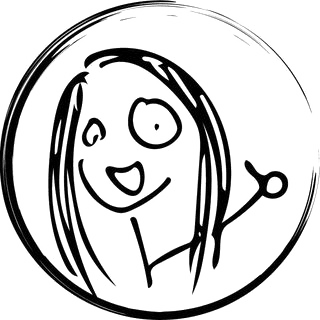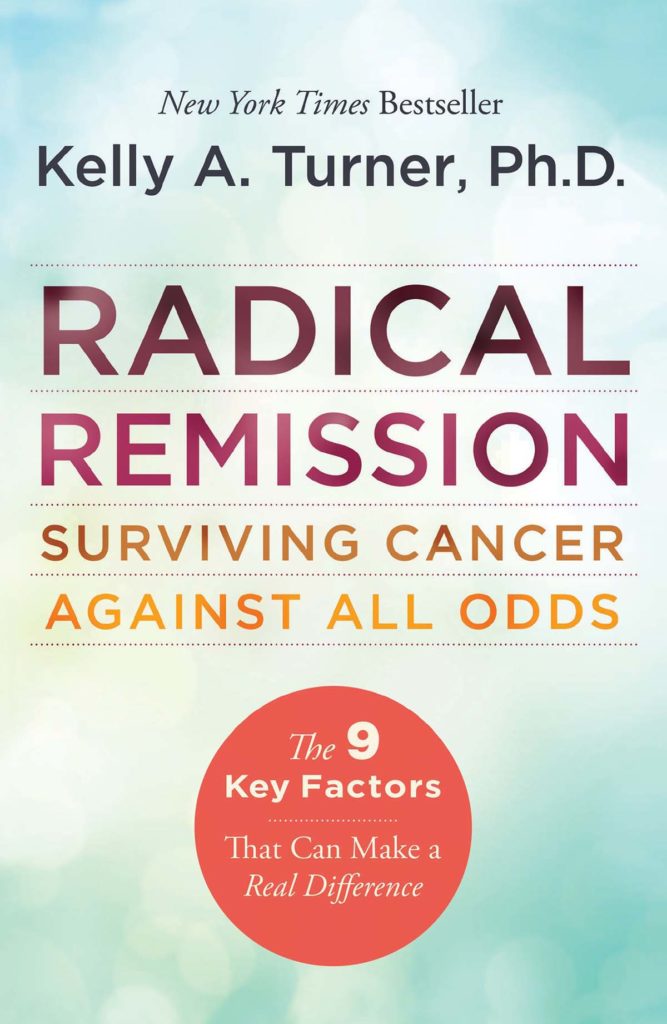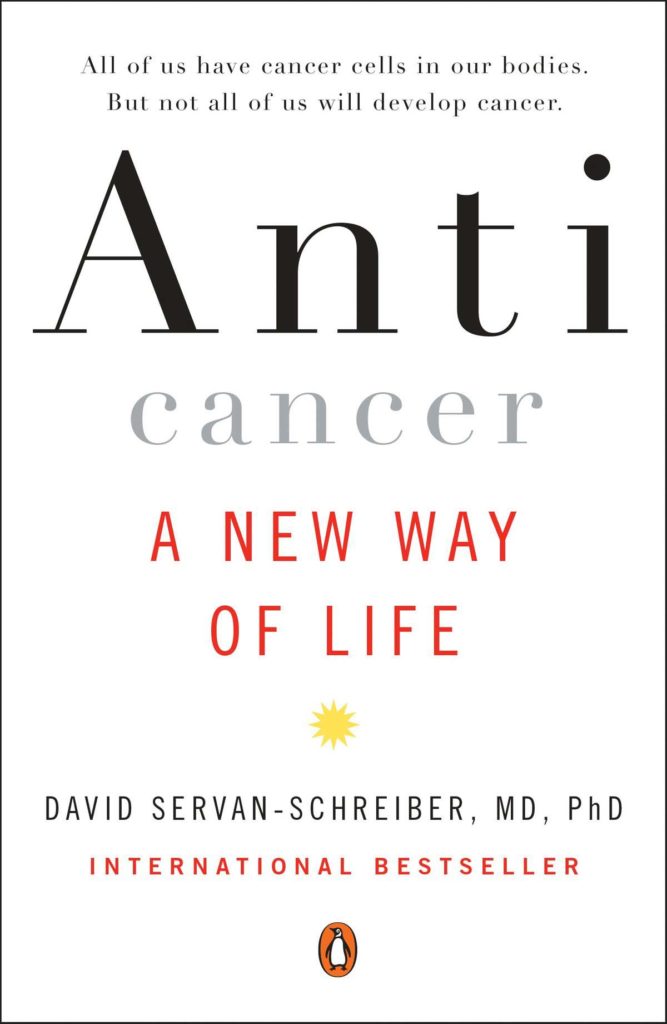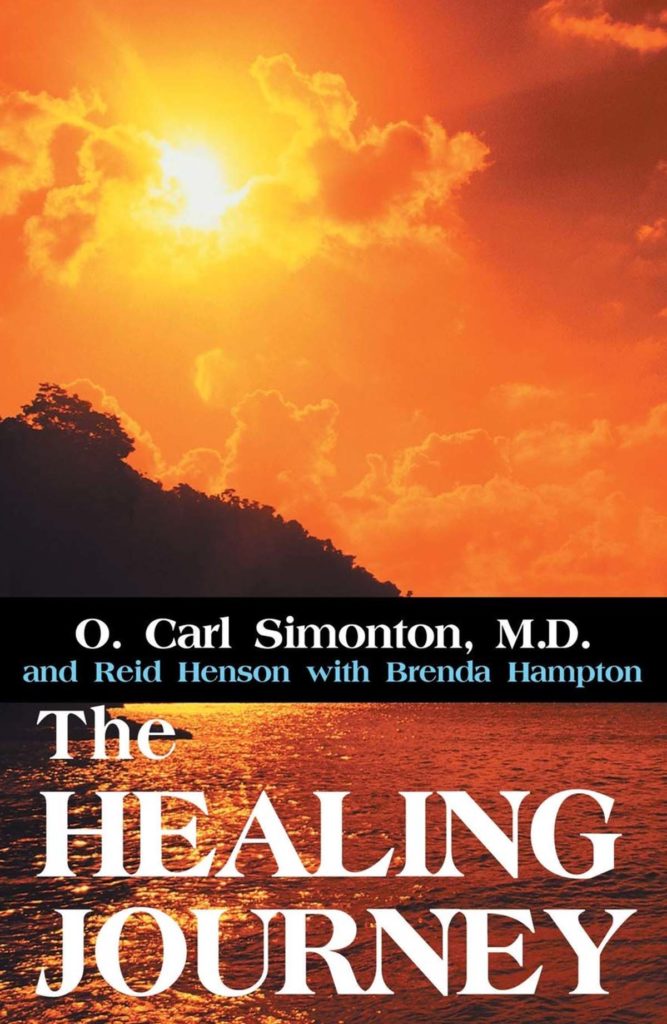Resources
Radical Remission by Kelly Turner, PhD
This is the first book I read after diagnosis. At the time, I wasn’t really able to do much else. I could barely move – if I did I would have a coughing fit…which sometimes led to accidents. This book gave me an anchor to rest on when I felt mostly afloat and lost.
The author is a researcher who has traveled the world examining cases of patients who lived with cancer, defying the odds. She summarizes the gist of what people have done in 9 categories, some of them are more out there than others.
Overall Feel: Hope inspiring. Mind opening. Comforting.
How I used this book: Sprinkled throughout this book are exercises that helped guide my reading. They also created some structure to help engage with life.
The most useful “action steps” for me were:
1. Taking control of your health (pages 72 – 73): Very sage advice about how to find a good doctor, what kinds of things to read, and finding the right partners/support in this experience.
2. Having strong reasons for living (pages 274 – 275): This includes a 3-part exercise about finding your deepest calling. It was fun to do and really stimulated my imagination in a feel-good way. The answers I got weren’t what I expected. What did you think of the exercise?
3. Positive prescriptions (pages 190 – 192) Smiling every day is a gift. Reading this section gave me permission to avoid things I didn’t like and permission to embrace my wants and dreams.
Caveats: Some of the categories in this book challenge my sense of reason. I think it’s best to use this book as a brainstorming book rather than a bible to follow word for word. Read carefully. Consider thoughtfully and choose to do something (or not) if it speaks to you.
Anticancer – a New Way of Life by David Servan-Schreiber, MD, PhD
Once I ordered one book, it started a domino effect. Reading became a way to gather my bearings when all I knew was suddenly uncertain. As a trained scientist, I ordered this book based on credentials – it was written by an MD, Ph.D. who also was a cancer survivor.
This book is a well researched book about changing one’s life in the face of a cancer diagnosis (or to prevent cancer). Given this, I suggest that anyone living with cancer consider the author’s suggestions strongly.
Overall feel: Evidence based yet also heart wrenchingly human. Overall very useful.
How I used this book:
1. There are several chapters reviewing how changes in environment and diet may be important. Taken together the information can be overwhelming. I read the book through once and then revisited the parts of the book that stood out to me. I used the lens of “can I or should I make a change in this category?” If yes, I did so. If not, I acknowledged the information and gained knowledge. I tried my best not to worry about what I could not change at that time.
2. There is an illustrated action plan inserted in the book. There are some very useful graphs including charts of foods that slowed cancer growth broken down by cancer type. I’m working on upping my garlic and brussels sprouts!
3. This individual’s story and its trajectory were very interesting. The author is a very accomplished and capable man. Yet, the story he writes illuminates how cancer exposes our strengths and weaknesses – our humanity. This, along with his follow up book, has served as an important lesson that cancer requires a true turning inward – an opportunity to really examine all of what makes us who we are and learn to change for the better.
4. The sequel of this book, Not the Last Goodbye, is much shorter and more of a memoir. This book was a very important read for me – it taught me to not take myself, my health and the moments where I feel okay for granted – to not forget that I must care for myself first.
Caveats: As someone who spent her entire life in the sciences, this book was hard to get into. The cold hard science was not a soft and squishy cushion for my new reality facing a terminal illness. This book is a mix of the author’s story, evidence-based science and recommendations of what to do. At times, I found these juxtapositions a little jarring.
It jumps from being an emotional memoir into the deep of scientific data. It goes back and forth. It was blended well it’s just still a bit jarring.
As I kept reading, I realized that this encapsulated the nature of the author. He is a scientist and a physician who happens to be a cancer patient. I recommend having patience with this book. It will provide some clear messages that I found very useful.
The Healing Journey by O. Carl Simonton, MD
I came upon this book while researching cancer retreats. I needed to getaway. I was completely overwhelmed. By this time, I was in full-blown treatment. I was slowly regaining my strength and respiratory status. But the world around me was not making healing easy.
Unfortunately, my kids’ father passed away right before my diagnosis. I was too sick to take care of myself. My fiance and I haphazardly blended our families (he with a young daughter and me with two teen boys). That was compounded by my loss of health insurance, my inability to start the new job I had planned to take, and the legal implications surrounding my ex’s death. A mountain of paperwork in legalese, long hours of being on hold, and traversing courthouses and social service organizations by wheelchair while barely able to talk.
I NEEDED and out.
On Google, I found the Simonton Cancer Center. They provide weeklong retreats for patients and their caregivers. It all sounded great until I saw the price tag. This was one of their recommended books. At that juncture, the physical retreat was not in my cards but this book was very helpful.
What I found helpful in this book:
1. Communicating with your support person (page 49): I found the comments about overbearing support people particularly validating. That helped my consciousness about what bystanders are going through and helped me figure out what to say and how to talk to them.
2. Plan for changing beliefs and developing greater emotional mastery (pages 68-69): I revisited this exercise recently when I was feeling particularly uncertain about some recent health challenges. Cancer is inherently anxiety provoking. The exercise helped me cut through the anxious fog and find some solid clarity.



